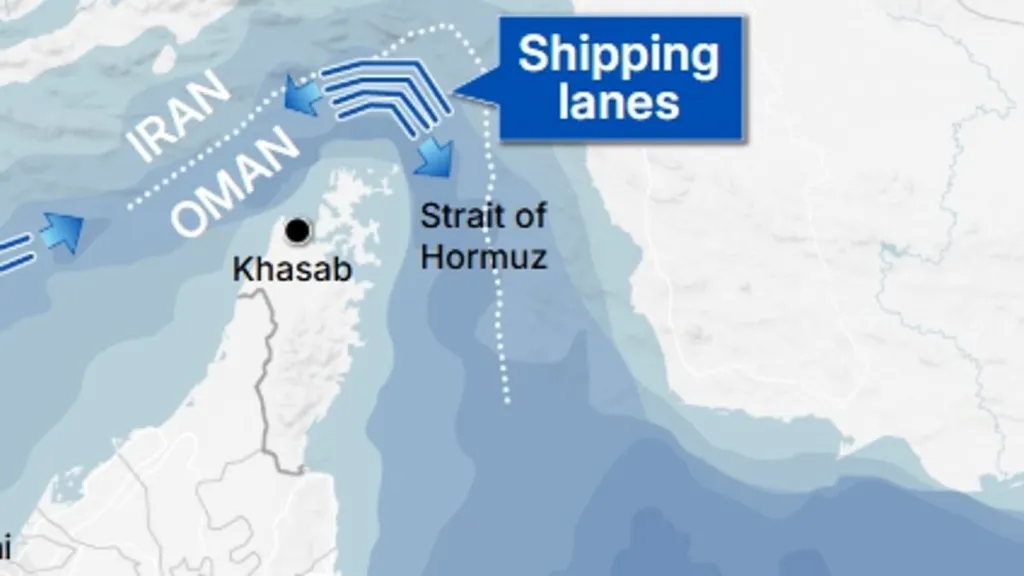Two huge supertankers U-turned in the Strait of Hormuz yesterday amid fears Iran could disrupt the global oil trade by closing the passage in response to U.S. strikes.
The Coswisdom Lake and South Loyalty, each capable of transporting about two million barrels of crude, entered the passage on Sunday before abruptly changing course and leaving, according to Bloomberg.
It was unclear what caused the two empty ships to head south, away from the mouth of the Persian Gulf.
Analysts have been closely monitoring the strait since the U.S. bombed three nuclear facilities in Iran earlier on Sunday.
Iran's parliament was reported to have backed a move to close the strait late on Sunday, threatening around a fifth of all global oil movements.
Iranian state television reported that the legislature had come to an agreement, but Supreme leader Ayatollah Khamenei would have to make the final decision, it said.
The closure of the strait, a chokepoint between Iran and Oman, would threaten petroleum shipments from Persian Gulf countries, likely spiking prices.
Oil prices jumped more than four percent early Monday, and Dutch and British wholesale gas prices rose today as markets braced for Iran's response.
Analysts have warned that a decision to close the Strait would meaningfully impact global oil flows and be tantamount to a declaration of war.
'A move to close Hormuz would be an effective declaration of war against the Gulf states and the U.S.,' Eurasia senior analyst Gregory Brew told Axios.
But whether Iran has the resource and will to suffocate its adversaries is unclear.
'Iran in its weakened state is unlikely to seek escalation of that kind at this time,' he added.
Chris Weston at Pepperstone said Iran would be able to inflict economic damage on the world without taking the 'extreme route' of trying to close the Strait of Hormuz.
'By planting enough belief that they could disrupt this key logistical channel, maritime costs could rise to the point that it would have a significant impact on the supply of crude and gas,' he wrote.
At the same time, 'while Trump's primary focus will be on the Middle East, headlines on trade negotiations could soon start to roll in and market anxieties could feasibly build'.
Iran's armed forces nonetheless threatened on Monday to inflict 'serious, unpredictable consequences' on the U.S. in retaliation for its strikes on nuclear sites.
'This hostile act... will widen the scope of legitimate targets of the armed forces of the Islamic Republic of Iran and pave the way for the extension of war in the region,' said armed forces spokesman Ebrahim Zolfaghari on state television.
Ali Akbar Velayati, an adviser to Iran's supreme leader Ayatollah Ali Khamenei, said bases used by US forces 'in the region or elsewhere' could be attacked.
The US State Department issued a 'worldwide caution' for Americans on Sunday.
China today warned against 'the spillover of war', urging the international community to do more to prevent the fighting from impacting the world's economy, noting the global importance of the Gulf maritime trade routes off the Iranian coast.
The leaders of Britain, France and Germany have called on Iran 'not to take any further action that could destabilise the region'.
At a UN Security Council emergency meeting Sunday, Secretary-General Antonio Guterres warned against 'descending into a rathole of retaliation after retaliation'.
Asian markets traded lower today amid concerns of disruption to energy markets after the US air strikes 'obliterated' Iran's nuclear facilities on Saturday night.
The dollar strengthened as traders assessed the weekend's events, with Iran threatening US bases in the Middle East as fears grow of an escalating conflict in the volatile region.
Iran is the world's ninth-biggest oil-producing country, with output of about 3.3million barrels per day.
It exports just under half of that amount and keeps the rest for domestic consumption.
If Tehran decides to retaliate, observers say one of its options would be to close the strategic Strait of Hormuz - which carries 20 per cent of global oil output.
Brent crude futures were up $1.52 or 1.97 per cent to $78.53 a barrel as of 6am UK time. US West Texas Intermediate crude advanced $1.51 or 2.04 per cent to $75.35.
Both contracts jumped by more than 3 per cent earlier in the session to $81.40 and $78.40, respectively, touching five-month highs before giving up some gains.
Economists at MUFG warned of 'high uncertainty of the outcomes and duration of this war', publishing a 'scenario analysis' of an oil price increase of $10 per barrel.
'An oil price shock would create a real negative impact on most Asian economies' as many are big net energy importers,' they wrote, reflecting the market's downbeat mood.
Tokyo's key Nikkei index was down 0.6 per cent at the break, with Hong Kong losing 0.4 per cent and Shanghai flat. Seoul fell 0.7 per cent and Sydney was 0.8 per cent lower.
The dollar's value rose against other currencies but analysts questioned to what extent this would hold out.
'If the increase proves to be just a knee-jerk reaction to what is perceived as short-lived US involvement in the Middle-East conflict, the dollar's downward path is likely to resume,' said Sebastian Boyd, markets live blog strategist at Bloomberg.
US Defense Secretary Pete Hegseth said on Sunday that the strikes had 'devastated the Iranian nuclear programme', though some officials cautioned that the extent of the damage was unclear.
